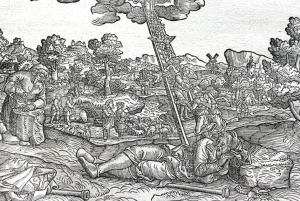 The joke is told about a priest, Father Murphy, and little Eileen O’Connell, a third-grader in his catechism class. Father Murphy was explaining one day that Jesus was a Jew, not a Christian. Jesus was born a Jew, lived a Jewish life, and died a Jew. The implacable, red-haired Eileen O’Connell shoved her freckled arm into the air and shook it violently. “Yes, Eileen,” the unflappable priest responded, “What is it?” “Well, Jesus may have been a Jew, Father Murphy, but his mother was a Catholic!”*
The joke is told about a priest, Father Murphy, and little Eileen O’Connell, a third-grader in his catechism class. Father Murphy was explaining one day that Jesus was a Jew, not a Christian. Jesus was born a Jew, lived a Jewish life, and died a Jew. The implacable, red-haired Eileen O’Connell shoved her freckled arm into the air and shook it violently. “Yes, Eileen,” the unflappable priest responded, “What is it?” “Well, Jesus may have been a Jew, Father Murphy, but his mother was a Catholic!”*
Truth be told, many Christians feel this way about Jesus. He’s our messiah, not theirs. He’s our savior, not theirs. He’s our lord, not theirs.
That’s what makes caricatures of Judaism in Jesus’ day so dangerous. And that is why I’ve picked on Christian Piatt during Advent—not because he’s more wrong than anyone else, but because he’s so vivid in how he expresses this point of view, when he writes,
Yes, people called out to Jesus to save them, and he did indeed offer salvation. Just not in the way they [the Jews] had expected. They longed for a conqueror to ride in, kick ass, and take names, but instead he arrived as the Suffering Servant, vulnerable to the worst that humanity could bear to heap on him. (page 47)
In my first Advent post, I challenged this point of view by showing that Judaism in Jesus’ day was far more diverse than this sort of characterization communicates. Judaism was populated by poor and rich, rural folk and urban elite, northerners and southerners, Pharisees and Sadducees and Zealots. There was no single expectation, no sole longing, no solitary hope that made every Jew the same.
If you don’t believe me, just watch (if you can tolerate the irreverence of it) the beginning of Monty Python’s Life of Brian, where a group in the back of the crowd is listening to Jesus. Jesus says one thing, and six or seven things get heard, depending upon who’s doing the hearing. You’ve got a rich aristocrat who pontificates, in a posh British accent, on “Blessed are the Cheesemakers,” which is what they hear that far back. “It’s not meant to be taken literally,” he drawls “but refers to any manufacturer of dairy products …” You’ve got a working-class woman who hears, “Blessed are the meek,” and responds, “Oh, that’s nice. They ‘ave a ‘ell of a time.” You’ve got the Zealots, in their black cassocks, who walk away disgusted because Jesus hasn’t said anything to upset the status quo.
It’s not science or even good history–more a spoof on the British class system than first-century Judea–but Life of Brian is better than portraits of Judaism that diminish diversity, so I use this clip to introduce students to the variety of hearers Jesus was forced to confront. There simply wasn’t one brand of Judaism.
In my second Advent post, I challenged Christian Piatt’s point of view by showing that the Jews didn’t always get their expectations wrong. A single, small scrap from the Dead Sea Scrolls, called the Messianic Apocalypse, makes this clear. In that text, the messiah is expected to raise the dead—which is precisely what Jesus tells John the Baptist he has done. In fact, in the preceding story, that’s what Jesus did: raised the son of a widow. You see? Jesus fulfills exactly what some Jews expected of their messiah. It’s wrong, therefore, to argue that the Jews expected one thing, but that Jesus was something quite different. It’s misguided to say the Jews expected a “kick ass” messiah, but that Jesus was a suffering servant. It’s just not right.
Worse still, this characterization of Jews in Jesus’ day produces precisely the sort of self-righteousness that Christian Piatt detests. He is right to loathe self-righteousness. But then to adopt this scenario, in which the Jews got wrong what Christians get right, is to promote a collective self-righteousness, a Christian Correctness, which simply can’t be supported by documents we have at hand.
What sort of messiah did the Jews of Jesus’ day expect? This isn’t an especially sexy question. For those of us Christians who celebrate Christmas, what the Jews thought may be a secondary question. Who cares? So we offer unexamined caricatures of what Jews thought because our real interest isn’t in the Jews of Jesus’ day—but in Jesus himself.
But Jesus was a Jew, a member of a variegated race of people, notwithstanding little Eileen O’Connell’s protests or our points of view.
Christians have a history of getting our relationship with Jews all tangled up in self-interest. Let’s not let that happen again. Especially not at the start, before Jesus took his first steps, before Bethlehem.
____________________________________________________________________________________________
Quotation from my Inspired: the Holy Spirit and the Mind of Faith (Eerdmans, 2012), p. 209.
Photo with permission of Jeremy Pope-Levison











